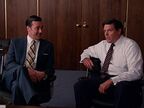When I browsed the film reviews, I saw a "literary and artistic" review that ties Mad Men, Andy Warhol, and Pop Art abruptly. Now that Andy Warhol is mentioned, I have to make some comments. Andy is not the first artist to play Pop, but he is more famous, and his hype tricks were at their peak at the time. It is the hype that makes Andy, not his art. Most of these hype tricks are learned from advertisers. It can be said that it is the American business culture, especially the crazy development of the advertising industry in the 1960s, that created people like Andy. His works were spawned by the development of the advertising industry and commodity society in the United States. Andy should thank these advertising talents. The so-called art has always been something of a minority. From ancient times to the present, this is true both at home and abroad. Even the most popular pop art is hard for us ordinary people to really own. Let alone true appreciation and evaluation.
So the focus of this film is not on the artistry, nor on rock feasts, nude parties, etc. Marriage infidelity, concealment and deception in life, illegitimate children, the marriage and career of the rich second generation... Does it sound familiar? All of this is caused by the crazy impact of the commodity society. It is very similar to our current life. Regardless of the beauty in the market, a person is always a person, and he/she must face many unavoidable problems in life. This film is a reflection on the entire society of that era. And it's quite profound. It may not be without inspiration to our lives nowadays. After all, we have just begun to take the path that the United States has taken decades ago.
Don't see that everything is applied to such difficult literary vocabulary as Pop and Dada. Let go of those more "literary and artistic" ideas. It is this kind of thinking that makes the real art farther and farther away from us. After all, literature and art are just things like a halo or a protective net for a handful of people. Without this shell, these people don't even have a reason to live. If everyone can understand the so-called literature and art, then most of those who engage in art will lose their jobs. The most important thing is to learn to see through the things behind "literary and artistic". Take a look at how the experimental film and human photography artists in the fourth episode of the fourth season were driven to nowhere by the police. The so-called utopia of art in the 1960s actually didn't exist at all. Again, if there is no commercial promoter, it does not matter at all about the art of the 1960s. Some people may argue that we learned about American business culture through Andy. Then I want to say: Now there is a better choice-Mad Men. Compared with Andy Warhol's speculative pop art, this TV series is more real, deeper and more comprehensive. From our perspective today, many sections in the film seem familiar. Our commercialization process has just begun. The Don of 50 years ago may be me or you tomorrow.
View more about Mad Men reviews











